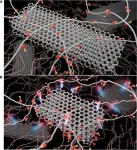(Press-News.org) Embargoed for release until 10:00 a.m. ET on Friday 4 April 2025
Embargoed Content from the Annals of Internal Medicine Breaking News Scientific Plenary at Internal Medicine 2025
Annals of Internal Medicine Tip Sheet
@Annalsofim
Below please find summaries of new articles that will be published in the next issue of Annals of Internal Medicine. The summaries are not intended to substitute for the full articles as a source of information. This information is under strict embargo and by taking it into possession, media representatives are committing to the terms of the embargo not only on their own behalf, but also on behalf of the organization they represent.
----------------------------
1. AI-driven clinical recommendations may aid physician decision making to improve quality of care
Overall, in real life clinical settings, AI recommendations were rated as superior to physicians with less risk for potential harm
Abstract: https://www.acpjournals.org/doi/10.7326/ANNALS-24-03283
Editorial: https://www.acpjournals.org/doi/10.7326/ANNALS-25-00472
URL goes live when the embargo lifts
A study comparing artificial intelligence (AI)-driven clinical recommendations to physician decision-making for common acute complaints in a virtual primary care setting found that AI support has the potential to improve quality of care when implemented responsibly. In the study, AI recommendations were largely rated as superior to physicians by expert adjudicators. Trained on a massive amount of high-quality, real-world clinical data, which is far beyond what any physician would see in their lifetime, AI uses modeling to calculate real probabilities for diagnosis and referrals and then derives treatment plans from these probabilities based on the latest medical guidelines and protocols. Combined with human physician discernment, this approach could improve patient care and outcomes. The findings will be presented at the breaking news scientific plenary session "New in Annals of Internal Medicine: Hear it First from the Authors" held at the New Orleans Ernest N. Morial Convention Center during the American College of Physician’s (ACP) Internal Medicine Meeting 2025. The paper also is published in Annals of Internal Medicine.
Researchers from Tel Aviv University, Cedars-Sinai Medical Center, and K Health, Inc. compared initial AI-driven clinical recommendations to final physician decision-making at Cedars-Sinai Connect, a virtual primary care clinic run by Cedars-Sinai, leveraging K Health Clinical AI platform. To evaluate AI versus physician performance, four expert adjudicators reviewed 461 real life primary care visits involving acute urinary, vaginal, respiratory, eye, and dental chief complaints, conditions for which AI has shown high diagnostic accuracy, and used a checklist to rate both the AI and physician recommendations. Patients described their symptoms through an AI-guided medical intake with their medical records automatically synced from the EHR, allowing physicians to review the AI-generated diagnosis, treatment recommendation, and any suggested prescriptions, labs, or referrals before the virtual visit where doctors would make the final clinical decision. Physicians could access the initial AI decisions but the researchers were unable to determine whether they did before making their final care decisions. Overall, the expert adjudicators rated the AI's recommendations higher than physicians’ decisions. In about 2/3 of cases, doctors made the exact same clinical decisions as the AI. In the remaining 1/3 of cases, AI's recommendations were rated as superior twice as often as they were inferior. AI received only about half as many "potentially harmful" ratings compared to physicians.
According to the researchers, these findings demonstrate the strengths of AI and how it complements human practice. AI is designed to follow medical guidelines much more strictly and can pick up on subtle details or medical record notes that doctors may miss. However, doctors have a clear advantage in clarifying symptoms during the visit. Where AI and good doctors align is in their level of caution. If AI is not confident, it will not make a recommendation, which is what happened in about 20% of cases.
The author of an accompanying editorial from Tufts University School of Medicine points to the study strengths while offering notes of caution about incorporating AI into medical practice. A common-sense approach to using AI may include using it to confirm physician diagnoses and therapeutic recommendations rather than making them. If discrepancies exist, then physicians should seek to determine why, which can be the seeds for improving the AI tool. The author emphasizes that to enhance clinical relevance, experienced clinicians should be involved in AI program development.
Media contacts: For an embargoed PDF, please contact Angela Collom at acollom@acponline.org. To speak with an author, please coordinate an interview with an author, please email Lauren Hobson at lhobson@moxiegrouppr.com or Michal Kaplan-Nadel at michal@moxiegrouppr.com.
----------------------------
2. Switching to tirzepatide rather than increasing dulaglutide dose leads to better glucose control and more weight loss in patients with inadequately controlled diabetes
Abstract: https://www.acpjournals.org/doi/10.7326/ANNALS-24-03849
URL goes live when the embargo lifts
For patients with inadequately controlled type 2 diabetes, switching to tirzepatide improves glucose control and increases weight loss more so than maximizing dulaglutide dose. This is important because delays in attaining at-goal glucose control can increase the risk and progression of diabetes-related complications like kidney disease and eye disease. The findings will be presented at the breaking news scientific plenary session "New in Annals of Internal Medicine: Hear it First from the Authors" held at the New Orleans Ernest N. Morial Convention Center during the American College of Physician’s (ACP) Internal Medicine Meeting 2025. The paper also is published in Annals of Internal Medicine.
The SURPASS-SWITCH (A Phase 4, Randomized, Open-Label, Active-Controlled Study to Investigate the Efficacy and Safety of Switching from Weekly Dulaglutide to Weekly Tirzepatide in Adults with Type 2 Diabetes) trial was a multicenter study conducted in five countries designed to address a common clinical experience for physicians prescribing a GLP-1 RA for the treatment of type 2 diabetes. In the study, sponsored by Eli Lilly and Company and led by Endeavor Health system (Chicagoland, Ill.), researchers across nearly 40 study sites, researchers sought to determine the safety and effectiveness of escalation of dulaglutide dose versus switching to tirzepatide in patients with inadequately controlled type 2 diabetes. Participants were randomly assigned to either continue on dulaglutide at a higher dose or switch to tirzepatide. Medication doses were gradually increased to 4.5 mg of dulaglutide or 15 mg of tirzepatide, or the highest dose the participant could tolerate. The primary end point was change from baseline in HbA1c at week 40. The key secondary end point was change from baseline in weight at week 40.
The researchers found that switching to tirzepatide resulted in greater HbA1c reduction than escalating dulaglutide dosage, with 21.3% receiving tirzepatide compared with 2.4% receiving dulaglutide achieving an HbA1c value less than 5.7%, the threshold for normal blood glucose levels. Participants in the tirzepatide group also had a mean of 6.9 kg greater weight reduction with 58% of participants on tirzepatide (vs 6.8% on dulaglutide) achieving 10% or greater weight reduction, a threshold that has been observed to have disease-modifying effects. Adverse effects were similar in both groups. The study authors note that further research is needed to assess the potential benefit of early glycemic control via early medication switching on longer-term clinical outcomes.
Media contacts: For an embargoed PDF, please contact Angela Collom at acollom@acponline.org. To speak with the presenting author, Liana K. Billings, MD, please email Baylee Pulliam at BPulliam@northshore.org.
-------------------------------
3. ACP’s Best Practice Advice addresses use of cannabis, cannabinoids for chronic noncancer pain
Abstract: https://www.acpjournals.org/doi/10.7326/ANNALS-24-03319
URL goes live when the embargo lifts
The American College of Physicians (ACP) has issued Best Practice Advice for clinicians whose patients are considering or using cannabis or cannabinoids for management of chronic, noncancer pain. The details will be presented at the breaking news scientific plenary session "New in Annals of Internal Medicine: Hear it First from the Authors" held at the New Orleans Ernest N. Morial Convention Center during the American College of Physician’s (ACP) Internal Medicine Meeting 2025. The paper also is published in Annals of Internal Medicine.
ACP’s Best Practice Advice paper is intended to inform clinicians about the evidence regarding the benefits and harms of cannabis or cannabinoids in the management of chronic noncancer pain and to provide advice for clinicians counseling patients seeking to use cannabis or cannabinoids for chronic noncancer pain.
Cannabis use for medicinal purposes has grown among patients with chronic noncancer pain. When referring to any product derived from the plant, many use the term cannabis, but the term has become interchangeable with colloquial terms such as marijuana, weed, and pot. As of 2024, 24 states in the U.S. and the District of Columbia have legalized cannabis for adult recreational and medical use, and it is legal for medical use only in an additional 14 states.
In its Best Practice Advice ACP says clinicians should:
Counsel patients about the benefits and harms of cannabis or cannabinoids when patients are considering whether to start or continue to use cannabis or cannabinoids to manage their chronic noncancer pain.
Counsel the following subgroups of patients that the harms of cannabis or cannabinoid use for chronic noncancer pain are likely to outweigh the benefits:
Young adult and adolescent patients
Patients with current or past substance use disorders
Patients with serious mental illness
Frail patients and those at risk of falling
Advise against starting or continuing to use cannabis or cannabinoids to manage chronic noncancer pain in patients who are pregnant or breastfeeding or actively trying to conceive.
Advise patients against the use of inhaled cannabis to manage chronic noncancer pain.
For many patients, evidence suggests that the known harms of cannabis and cannabinoid use outweigh the potentially small degree of benefit to ease chronic noncancer pain. Additionally, cannabis can be addictive, even if being used to manage chronic noncancer pain. It’s also difficult to apply the information from clinical studies to practice in the U.S. because the potency (delta-9 tetrahydrocannabinol or THC content) of products in dispensaries is typically far higher than that used in studies. Another challenge is that in most U.S. states, patients will obtain cannabis for chronic pain through a dispensary with less medical oversight than they would receive for FDA-approved medications.
Clinicians are best positioned to provide evidence-based information about the benefits and harms most relevant to an individual patients’ needs and comorbidities so that patients can make an informed decision about starting or continuing cannabis or cannabinoid use for chronic noncancer pain. For most patients, common treatments and analgesic medications should be recommended first given the limited evidence of small benefit and the known harms associated with cannabis and cannabinoid products.
ACP has also published a position paper where it recommends a public health approach to address the legal, medical, and social complexities of cannabis use.
This Best Practice Advice is based on a review and assessment of scientific work including a living, systematic review on cannabis and cannabinoid treatments for chronic noncancer pain, a series of living systematic reviews, as well as additional evidence from primary studies.
Media contacts: For an embargoed PDF, please contact Angela Collom at acollom@acponline.org. To speak with someone from ACP, please contact Andy Hachadorian at ahachadorian@acponline.org.
----------------------------
END
AI-driven clinical recommendations may aid physician decision making to improve quality of care
2025-04-04
ELSE PRESS RELEASES FROM THIS DATE:
Artificial intelligence has potential to aid physician decisions during virtual urgent care
2025-04-04
Do physicians or artificial intelligence (AI) offer better treatment recommendations for patients examined through a virtual urgent care setting? A new Cedars-Sinai study shows physicians and AI models have distinct strengths.
The late-breaking study presented at the American College of Physicians Internal Medicine Meeting and published simultaneously in the Annals of Internal Medicine compared initial AI treatment recommendations to final recommendations of physicians who had access to the AI recommendations but may or ...
ACP and Annals of Internal Medicine present breaking scientific news at ACP’s Internal Medicine Meeting 2025
2025-04-04
ACP and Annals of Internal Medicine present breaking scientific news at ACP’s Internal Medicine Meeting 2025
Authors discuss research on AI in the exam room, switching GLP1-RAs for better glucose and weight control, and ACP’s best practice advice for the use of cannabis and cannabinoids for noncancer pain
NEW ORLEANS, April 4, 2025 – Today at the American College of Physicians (ACP) annual meeting, Internal Medicine Meeting 2025, in New Orleans, Annals of Internal Medicine presented three breaking scientific research articles during a live plenary session featuring the authors of those articles. The articles were published in ...
New study reveals polymers with flawed fillers boost heat transfer in plastics
2025-04-04
New Study Reveals Polymers with Flawed Fillers Boost Heat Transfer in Plastics
The UMass Amherst-led team challenges the conventional wisdom that perfect fillers are better for making thermally conductive polymers
AMHERST, Mass. — In the quest to design the next generation of materials for modern devices – ones that are lightweight, flexible and excellent at dissipating heat – a team of researchers led by the University of Massachusetts Amherst made a discovery: imperfection has its upsides.
This research, published in Science Advances, ...
Signs identified that precede sudden arrhythmic death syndrome in young people
2025-04-04
Milan, Italy – 4 April 2025. Recognising and detecting the signs that commonly precede sudden arrhythmic death syndrome (SADS) may help to prevent premature deaths, according to research presented today at ESC Preventive Cardiology 2025,1 a scientific congress of the European Society of Cardiology (ESC).
“SADS has not been well evaluated despite being one of the most common underlying causes of sudden cardiac death in young people, including young athletes,” said study author Dr. Matilda Frisk Torell of Sahlgrenska Academy - University of Gothenburg, Sweden. “We conducted an analysis of a large cohort of cases of sudden cardiac death in Sweden to ...
Discovery of bacteria's defence against viruses becomes a piece of the puzzle against resistance
2025-04-04
Antibiotic resistance is a global health challenge that could overtake cancer mortality within a few decades. In a new study, researchers at Umeå University, Sweden, show that the emergence of resistance can be understood in the mechanism of how bacteria build up defences against being infected by viruses. It is about genes in the bacterium that interfere with the attacking virus's ability to multiply.
"A key to antibiotic resistance might be the use of viruses to kill bacteria, however, the systems that bacteria employ to defence themselves against viruses are unknown. Understanding these ...
Pre-eclampsia is associated with earlier onset and higher incidence of cardiovascular risk factors
2025-04-04
Milan, Italy – 4 April 2025. Women who have experienced pre-eclampsia have accelerated accumulation of cardiovascular (CV) risk factors compared with women who had pregnancies without pre-eclampsia according to research presented today at ESC Preventive Cardiology 2025,1 a scientific congress of the European Society of Cardiology (ESC).
Pre-eclampsia typically affects 2−5% of pregnant women and is broadly defined as the development of hypertension and high protein levels in the urine of a woman with previously normal blood pressure.2 ...
Warwick astronomers discover doomed pair of spiralling stars on our cosmic doorstep
2025-04-04
University of Warwick astronomers have discovered an extremely rare, high mass, compact binary star system only ~150 light years away. These two stars are on a collision course to explode as a type 1a supernova, appearing 10 times brighter than the moon in the night sky.
Type 1a supernovae are a special class of cosmic explosion, famously used as ‘standard candles’ to measure distances between Earth and their host galaxies. They occur when a white dwarf (the dense remnant core of a star) accumulates too much mass, is unable to withstand its own ...
Soil conditions significantly increase rainfall in world’s megastorm hotspots
2025-04-04
Storm forecasting is traditionally based on studying atmospheric conditions but ground-breaking research that also looks at land surface conditions is set to transform early warning systems in tropical regions. This will enable communities to better adapt to the destructive impacts of climate change.
The new study led by the UK Centre for Ecology & Hydrology (UKCEH) has shown that a large contrast in soil moisture levels over a range of hundreds of kilometres results in atmospheric changes that increase rainfall area and amount in several megastorm hotspots globally. This increase ranges from 10 to 30% depending on the region and size ...
NK cells complexed with bispecific antibody yield high response rates in patients with lymphoma
2025-04-04
A novel cell therapy approach using cord blood-derived natural killer (NK) cells pre-complexed with AFM13, or acimtamig, a CD30/CD16A bispecific antibody, was safe and generated strong response rates for patients with refractory CD30-positive lymphomas, according to a new study from The University of Texas MD Anderson Cancer Center.
Results from the Phase I trial, published today in Nature Medicine, demonstrated an overall response rate of 92.9% and a complete response of 66.7% in 42 heavily pretreated patients. These findings ...
Planetary health diet and mediterranean diet associated with similar survival and sustainability benefits
2025-04-04
Milan, Italy – 4 April 2025. Two plant-based diets were associated with similar survival benefits and low environmental impact, according to research presented today at ESC Preventive Cardiology 2025,1 a scientific congress of the European Society of Cardiology (ESC).
Diet contributes significantly to cardiovascular disease mortality, with estimates indicating that across the European region, one in every five premature deaths could be prevented by an optimised diet.2
“In 2019, the Planetary Health Diet (PHD) was developed to optimise global dietary quality while keeping the environmental impacts of food production within sustainable planetary ...


